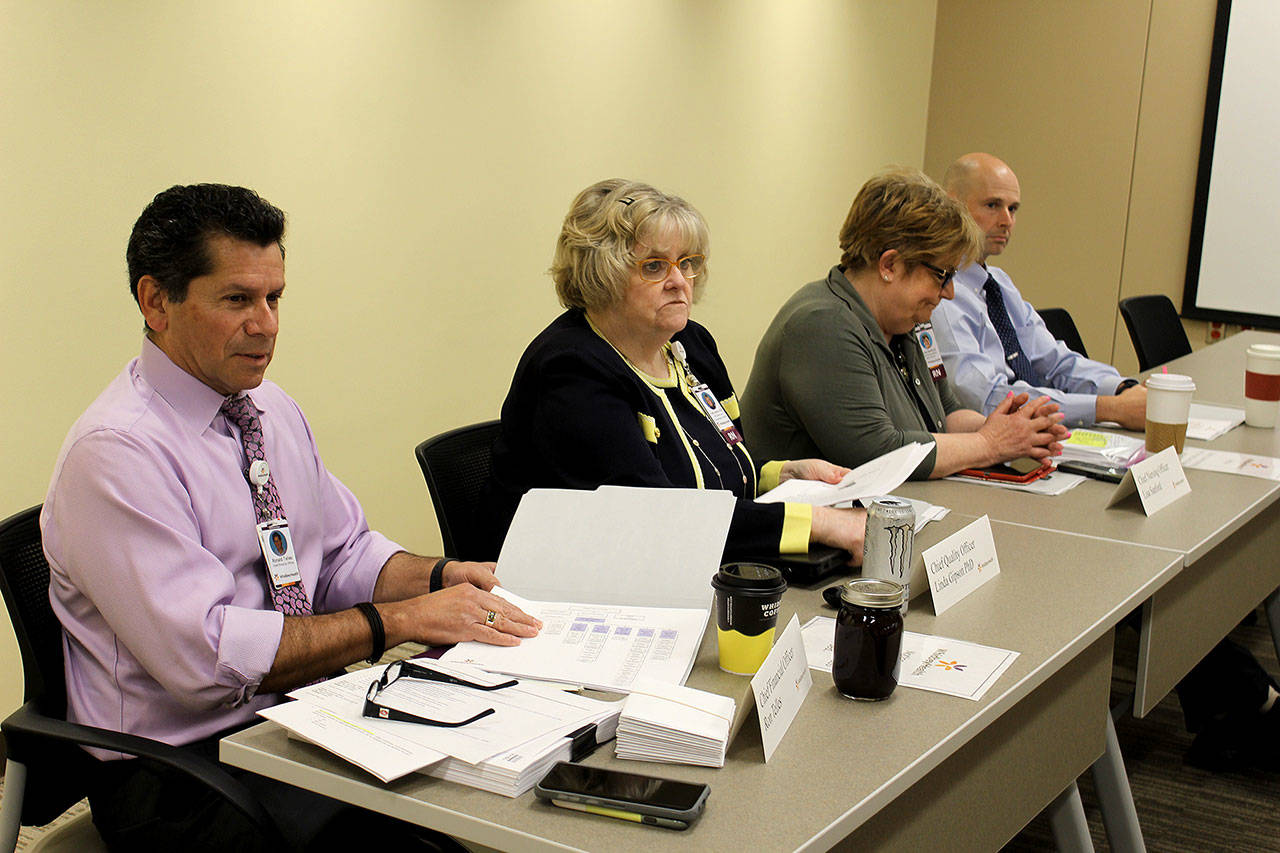Ron Telles didn’t waste any time assuming his new role as CEO of WhidbeyHealth at a Monday board meeting of the Whidbey Island Public Health District.
Minutes after signing a one-year contract, Telles vowed to restore confidence with employees and the public and to get WhidbeyHealth more involved in the community. He also outlined a 10-point plan of action to help heal the battered bottom line and talked about working toward national accreditation of the hospital.
But first, he said, WhidbeyHealth needs to be its own patient.
“Part of rehab is accepting you have a problem,” he said. “We have to accept the fact that some people don’t like us. We have to understand why. We need to know what the community is thinking.”
Telles served as chief financial officer under Geri Forbes, who resigned as CEO but remains as a consultant until July 1. Telles was named interim CEO last month until the board could meet in executive session to hammer out his contract and approve it in a public meeting.
Telles will continue to receive his current salary — $270,499 — until July 1; his pay then increases to $330,000 as the chief executive officer.
Bonuses aren’t included in the contract.
“Both parties have agreed there will not be incentive compensation under this agreement,” Jake Kempton, the health system’s lawyer, said at the meeting.
Commissioners unanimously approved the contract.
The contract is effective until May 12, 2020. Telles’ performance is to be evaluated in March by the board to determine whether the contract will be extended. If not, Telles can retain his former position as chief financial officer.
The contract authorizes up to $750 a month to reimburse Telles for expenses related to recruitment, team building and/or community outreach activities. Budgets and the bottom line will remain the purview of Telles as he combines his chief financial expertise with his new chief executive duties.
Giving his monthly budget review, Telles said the system has lost $500,000 this year so far, resulting in low cash reserves.
“This is scary,” he said, “to have cash on hand drop this low — to 13 days.”
“We have been losing money for the last year and a half,” he said in an interview. “This is a serious issue that affects all aspects of our health system.”
Board chairman Ron Wallin said there’s still a chance the board could begin a nationwide search for a CEO.
“This gives us time to see how things are going,” Wallin said. “It takes a good six months to put together a search. The CEO pools are getting very small.”
Wallin said “the things that are put in the paper” and social media make the search difficult because negative comments are read online nationwide.
“It really ties your hands,” he said.
However, he expressed optimism with “the new era.”
“I feel like we’re getting a good start over,” Wallin said. “It’s a new time for the board and the hospital.”
An outside firm has been hired to conduct a community survey to help understand where the system can improve, Telles said. It may help clarify some trends resulting in lost revenue, such as the steady decline in the number of scheduled surgeries.
“Surgeries are a major financial engine for any health system,” Telles said. “WhidbeyHealth has some of the finest surgeons, both general surgeons and orthopedic surgeons, and we want our community to utilize them.”
Both Telles and Wallin emphasized that a long-range strategic plan is needed in order to better adapt to changes in health care. Like hospitals around the nation, WhidbeyHealth Medical Center is experiencing a shift in how care is given, Telles explained.
“Health care is primarily practiced in an outpatient setting. Hospital systems have been slow to react to this change and WhidbeyHealth is no different,” he said. “That is why we will focus on our outpatient service lines to be able to change with our delivery system.”
One change involves implementing a practice called “swing beds.” These are inpatient beds that are made available for post-surgical patients not well enough to go home who are transferring from other hospitals. One example would be a Whidbey resident undergoing hip surgery in an Everett hospital who wants to recover closer to home, Telles said.
“People heal better when they’re with family,” he said. “Then, they’ll also realize how wonderful our hospital is.”
About $2,500 is charged per day for a patient recovering from surgery, Telles said.
Setting aside seven of the hospital’s 39 single patient rooms as “swing beds” could add up to annual revenue of $700,000, he estimated.
“By improving our revenue and cash flow and controlling our operating expenses, we can expect to meet our budget goals by the end of our fiscal year,” Telles said.
Employees will also be asked to participate in an anonymous survey about how they view WhidbeyHealth.
“We need honest answers,” Telles said. “How do our employees feel about us? Will they come here for services?”
In his new role as the top boss, Telles has also met with staff for informal chats, and he’s shadowed them on their jobs.
“What I heard over and over again is we do a bad job of telling our story,” he said. “So you’re going to start seeing us at parades. We need to be part of our community. That’s huge. We’ve been missing that.”



